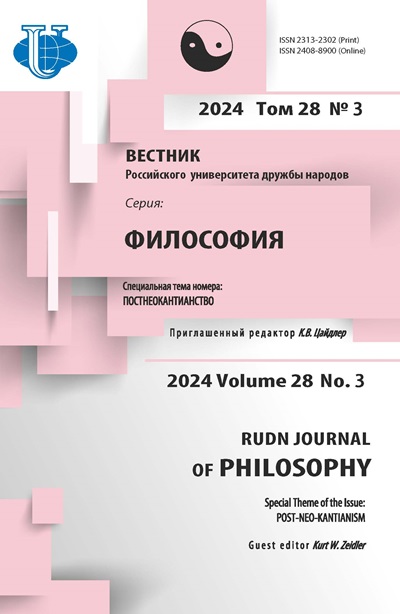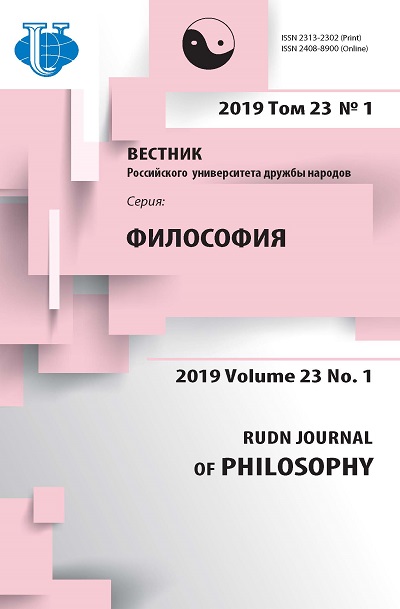Vol 23, No 1 (2019)
- Year: 2019
- Articles: 11
- URL: https://journals.rudn.ru/philosophy/issue/view/1178
- DOI: https://doi.org/10.22363/2313-2302-2019-23-1
Full Issue
HISTORY OF PHILOSOPHY: WEST-RUSSIA-EAST
FREEDOM, LOW AND IMAGINATION THE LECTURES OF F.W.J. SCHELLING IN 1800-1810s
Abstract
The gives the detailed analysis of the ratio of freedom and imagination in an unpublished manuscript written by F.V.Y. Schelling, which contains the materials for the lecture course read at Erlangen University in 1820-1821. The author focuses on the question of imagination as a condition for the possibility to unfold the modal differences that provide the hierarchy of predicative definitions. The article shows that both the draft philosophy of mythology and the philosophy of revelation are a direct continuation of the transcendentalist program given by Kant.Those projects bases on the thesis that the consciousness of freedom and consciousness of the law, justified in the “Critique of Practical Reason”, are related one another. Schelling following Kant’s theory, points to the law and to the unconditional imperative of freedom as the main principle which is not only theoretical or practical, but determines the separation of ontological and deontological modalities. At the same time, the formal structure of an imperative as a command has the specific character of “hiden opening”: what is themed in an imperative is not opened as a meaningful opportunity, it is only opened as theopportunity in its difference from necessity. I show in this article that interpreting the Schelling possibility relies on the teachings of I. Kant in his transcendental idealconception, connected with Kant's interpretation of the imagination’s productive ability. In the middle of Schelling’s theological interpretation of Kant's consciousness of lawdoctrine as the “fact of mind” lies the analogy between peacemaking and the ancestral sin of the first people. This concept is the main source of the theory of potency as ontological modalities, developed by Schelling in the 1830s - 1840s in lectures on the philosophy of mythology and the philosophy of revelation.
 7-18
7-18


THE PROBLEM OF VIKTOR NESMELOV’S PSYCHOLOGICAL ARGUMENT FOR THE EXISTENCE OF GOD IN THE CONTEXT OF HIS CHRISTIAN ANTHROPOLOGY: “PRO ET CONTRA”
Abstract
The article is devoted to the analysis of “psychological” argument for the existence of God of Viktor Nesmelov, professor of Kazan Theological Academy, represented in his fundamental work “Science of Man”. The main interpretations of this argument, formulated both contemporaries of Nesmelov (Nikolay Berdiaev, bishop Anthony (Khrapovitsky)) and modern researchers of his legacy (priest D. Lushnikov, bishop K. Goryanov) are considered. The basic prerequisites and origins of Nesmelov’s anthropological doctrine are analyzed. The main of them were V. Snegiryov’s psychological doctrine and anthropological ideas of St. Gregory of Nyssa. The main ideas of Nesmelov’s Christian anthropology, related directly to his formulation of “the idea of God” (the doctrine of consciousness and self-consciousness of man; idea of man as the “main riddle” of the universe; idea of the fundamental “duality” of human nature; doctrine of Theosis and God-manhood, doctrine of sin and universal salvation (apokatastasis), etc.) are revealed. Besides that, Nesmelov’s criticism of the main existing arguments for the existence of God (ontological, cosmological, teleological, psychological, etc.) is analyzed. The main conclusion based on the analysis of Nesmelov’s anthropological system is made: his argument for the existence of God represents rather a methodological program for creating such argument in the future. The base of this argument should be made of not only by an “ abstract knowledge”, but the “living worldview” and the “living unity of God and man”.
 19-31
19-31


THE PROBLEM OF UNIVERSAL SALVATION IN THE TEACHING OF RASHID RIDA
Abstract
The problem of salvation of non-Muslims is a crucial element in the discourse of Islamic modernism. It was no less important for such Islamic thinkers of the classical period as Ibn Qayyim al-Jawziyya and Abu Ḥamid al-Ġazali. The attention of the author of the present paper focuses on understanding the problem of salvation in the teaching of Muhammad Rashid Rida, who was one of the key participants in the modernist movement in Islam. Being a representative of “intellectual salafism”, Rashid Rida proposes a solution for the issue of salvation that comes as an alternative for traditionalist views predominating in Sunni Islam. The present paper serves to prove that Rida’s quite peculiar solution is deeply rooted in Islamic tradition. In particular, it relates to viewpoints of al-Jawziyya and al-Ġazali, which deflect from mainstream. Similar to many other Islamic modernists (we can consider as part of them proponents of Jadidism, such as M. Bigiev, Z. Kamali, R. Fahreddin and others), the main although not the only argument of Rida is based on the Quranic idea of all-embracing Divine grace. In his analysis of Rida’s position, the author notes that the former does not lean towards the liberal variant of Islamic reformism that supposes religious pluralism as one of its basic ideas. Advocating the superiority of Muhammad’s message, the Egyptian thinker adhered to a specific form of soteriological inclusivism that differs from religious pluralism. According to Rida, the main criterion for one’s salvation is whether one was touched upon by undistorted Islamic message or not. Rida was convinced that Gehenna only awaits those non-Muslims who received undistorted Islamic message, clearly understood its Divine source and thenintentionally rejected it. But even they may be redeemed, as God is not obligated to act on his declared threat.
 32-45
32-45


THE POLEMICS BETWEEN THE BUDDHISTS AND THE VAISHESHIKAS ON THE SELF IN “PUDGALAVINISHCHAYA” OF VASUBANDHU
Abstract
The article examines the controversy between the “orthodox” Indian philosophical school Vaiśeṣika and one of the greatest Buddhist philosophers - Vasubandhu (IV-V AD.) on the existence of subject (“ātman”) as a reality. The discussion is investigated on the example of the text “Pudgalaviniścaya” (hereinafter PV). PV of Vasubandhu - literally “Study on the Self”, or “pudgala” - is traditionally considered the 9th chapter of “Abhidharmakośabhaṣya” of the same author and is one of the most important polemical treatises on the self, or ātman, in Buddhist philosophy. Among the issues discussed are the famous “epistemological argument”, the ability of recall and perception, how a difference between moments of consciousness is possible, whether the substrate for consciousness is necessary. One of the strategies of Vasubandhu is that he tries to find internal contradictions in the arguments of opponents. We can say that the main argument of Vasubandhu is aimed at justifying the mechanism of the cause-and-effect occurrence of all phenomena (pratītya-samutpāda). If the Vaiśeṣikas proceed from their logic about the need for a substance for qualities, then Vasubandhu tries to persuade them to his side and offer a fundamentally new explanatory model, according to which there are only sequence-like moments-phenomena (dharmas) that flow from each other according to the law of cause and effect.
 46-55
46-55


SOCIAL PHILOSOPHY: LANGUAGE-MAN-SOCIETY
REFERENCES OF PROPER NAMES AS THE PROBLEM OF CONTEMPORARY PHILOSOPHY OF LANGUAGE
Abstract
 56-65
56-65


ANTHROPOLOGICAL CRISIS IN THE RISK SOCIETY: PHILOSOPHICAL ANALYSIS
Abstract
The article is devoted to the philosophical consideration of anthropological crisis in the risk society in his historical transformation. The research is aimed to anthropological analysis of the risk society in order to identify its new features in the modern era. As a methodological principle of research, the author defines the distinction between anthropological and cosmological approaches in philosophy. It is about their complex relationships and contradictions in the development of the civilizational process. The anthropological crisis becomes apparent when society becomes a “society of risk” in the modern era. The article reveals the cause of the anthropological crisis in the risk society: the social production of wealth becomes the production of risks. In the XXI century there is a “world society of risk” (Ulrich Beck), which is associated with the process of globalization. The risk research methodology suggests the need to anticipate unpredictable. The main difficulty in risk analysis is that the risk is between certainty and uncertainty, between rational and irrational. Two main trends - the reflexivity of the unknown and the cosmopolitan moment - point to a global change in the society in the 21st century, whose priority is security. In the historical and social philosophical perspective, security is understood as a concept that encompasses integrity, inviolability, inviolability with respect to corporeality, life and property. In the context of the modern anthropological crisis, security has become the main value concept of the social political language. The logic of uniqueness gives way to the logic of ambiguity, which finds its expression in the connection of the risk society with the cosmopolitism. The “cosmopolitan moment” of the world risk society presupposes recognition of the uniqueness of the Other as an opportunity to overcome the anthropological crisis.
 66-73
66-73


TRANSLATIONS AND PUBLICATIONS
RELIGIOUS-PHILOSOPHICAL HERMENEUTICS OF GERHARD OBERHAMMER (Based on Ramanuja’s ‘Sharanagatigadya’). Part III
Abstract
 74-76
74-76


IN THE PRESENCE OF THE OTHER. RAMANUJA’S SHARANAGATIGADYA. AN IMPORTANT TEXT OF THE VAISHNAVA RELIGIOUS TRADITION. Part III
 77-84
77-84


SCIENTIFIC REPORTS
THE EMBODIMENT OF SOCIAL VALUES IN MYTHOLOGY: THE AXIOLOGICAL CONTEXT OF THE WORKS OF JOHN R.R. TOLKIEN
Abstract
The article deals with the mythological creativity of G.R.R. Tolkien as a socio-cultural phenomenon associated with the values of European culture. The author proceeds from the hypothesis that the myth is the embodiment of social identity, this function it retains after the loss of its ideological functions. The revival of literary mythology in the XIX-XX centuries there is an attempt to update this feature of the myth. The success of the literary myth is due to the fact that he was able to absorb and Express the basic values of society. Tolkien’s work is one of the successful examples of the literary embodiment of socially significant values, combining both traditional values and value formations characteristic of the modern era. The article shows that Tolkien’s work has organically absorbed the pagan basis, the Christian attitude, and the values characteristic of the XX century. Pagan heroic principle, Christian mercy, the idea of freedom, democracy-all this is organically intertwined in the works of Tolkien, their success is due to the harmony of the whole range of social attitudes represented in the European consciousness of the mid XX century. Currently, the decline in interest in Tolkien is a reflection of the change of value preferences of European culture.
 85-93
85-93


SCIENTIFIC REVIEWS
PRACTICAL PHILOSOPHY: FROM THE CLASSICS TO THE INFORMATION SOCIETY ALL-RUSSIAN SCIENTIFIC CONFERENCE
 94-100
94-100


 101-108
101-108
















